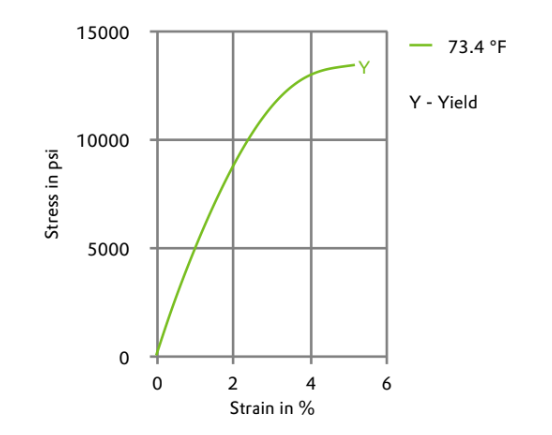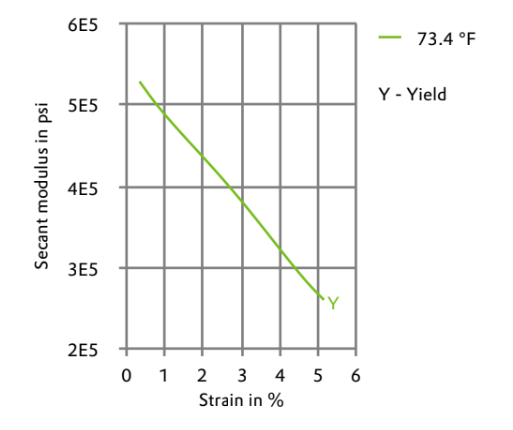Knowde Enhanced TDS
Identification & Functionality
- Additives Included
- Chemical Family
- Polymer Name
- Plastics & Elastomers Functions
- Technologies
Features & Benefits
- Labeling Claims
- Materials Features
- Product Highlights
VESTAKEEP® L4000 G are suitable for convoluted and corrugated tubes. The high temperature resistant PEEK is inherently flame retardant, has a high LOI, a low smoke density, and releases no toxic gasses in case of fire.
Applications & Uses
- Markets
- Applications
- Plastics & Elastomers End Uses
- Plastics & Elastomers Processing Methods
- Processing
- VESTAKEEP® L 4000 G can be processed by common machines for thermoplastics.
- The additional lubrication agent improves the feeding process.
- We recommend a melt temperature between 370°C and 380°C during the injection molding process. The mold temperature should be within a range of 160°C to 200°C, preferably 180°C.
Properties
- Flame Rating
- Mechanical Properties
- Physical Properties
- Thermal Properties
- Electrical Properties
- Rheological Calculation Properties
- Test Specimen Production
- Rheological Properties
- Burn Testing Properties
| Value | Units | Test Method / Conditions | |
| Tensile Modulus | 522000 | psi | ISO 527 |
| Tensile Strength | 13900 | psi | ISO 527 |
| Yield Stress | 13600 | psi | ISO 527 |
| Yield Strain | 5 | % | ISO 527 |
| Nominal Strain at Break (ɛtb) | 30 | % | ISO 527 |
| Charpy Notched Impact Strength (+23°C) | 3.33 | ftlb/in² | ISO 179/1eA |
| Charpy Notched Impact Strength (-30°C) | 2.85 | ftlb/in² | ISO 179/1eA |
| Flexural Modulus (23°C) | 500000 | psi | ISO 178 |
| Flexural Stress at Conv. Deflection (23°C) | 16500 | psi | ISO 178 |
| Flexural Strength (23°C) | 21500 | psi | ISO 178 |
| Flexural Strain at Flexural Strength (23°C) | 7 | % | ISO 178 |
| Value | Units | Test Method / Conditions | |
| Density | 1.3 | g/cm³ | ISO 1183 |
| Water Absorption | 0.5 | % | Sim. to ISO 62 |
| Humidity Absorption | 0.3 | % | Sim. to ISO 62 |
| Shore D Hardness (1s, Annealed) | 87 | — | ASTM D 2240 |
| Value | Units | Test Method / Conditions | |
| Melting Temperature | 644 | °F | ISO 11357-1/-3 |
| Temperature of Deflection Under Load A (1.80 Mpa) | 311 | °F | ISO 75-1/-2 |
| Temperature of Deflection Under Load B (0.45 Mpa) | 401 | °F | ISO 75-1/-2 |
| Vicat Softening Temperature A (10 N, 50 K/h) | 635 | °F | ISO 306 |
| Vicat Softening Temperature B (50 N, 50 K/h) | 581 | °F | ISO 306 |
| Coefficient of Linear Thermal Expansion (23°C to 55 °C, Parallel) | 3.33e-05 | in/in/°F | ISO 11359-1/-2 |
| Value | Units | Test Method / Conditions | |
| Volume Resistivity (pV) | min. 1E13 | Ohm*m | IEC 62631-3-1 |
| Surface Resistivity (σE) | 1000000000000000 | Ohm | IEC 62631-3-2 |
| Relative Permittivity (100Hz) | 2.8 | — | IEC 62631-2-1 |
| Relative Permittivity (1MHz) | 2.8 | — | IEC 62631-2-1 |
| Dissipation Factor (1Mhz) | 50 | E-4 | IEC 62631-2-1 |
| Comparative Tracking Index (Test Solution A, 50 Drops Value) | 200 | — | IEC 60112 |
| Performance Level Categories | 3 | — | ASTM D 3638 |
| Value | Units | Test Method / Conditions | |
| Thermal Conductivity of Melt | 1.25 | BTU in/(hr ft² °F) | — |
| Specific Heat Capacity Melt | 0.793 | BTU/(Ib-F) | — |
| Minimum Mold Temperature | 320 | °F | — |
| Maximum Mold Temperature | 392 | °F | — |
| Minimum Melt Temperature | 680 | °F | — |
| Maximum Melt Temperature | 716 | °F | — |
| Value | Units | Test Method / Conditions | |
| Injection Molding - Melt Temperature | 716 | °F | ISO 294 |
| Injection Molding - Mold Temperature | 356 | °F | ISO 294 |
| Injection Molding - Injection Velocity | 7.87 | in/s | ISO 294 |
| Injection Molding - Pressure at Hold | 17400 | psi | ISO 294 |
| Value | Units | Test Method / Conditions | |
| Melt Volume Flow Rate (at 716°F, 11lb) | 12 | cm³/10min | ISO 1133 |
| Molding Shrinkage (Parallel) | 0.9 | % | ISO 294-4, 2577 |
| Molding Shrinkage (Normal) | 1.1 | % | ISO 294-4, 2577 |
| Value | Units | Test Method / Conditions | |
| Burning Behavior (at 1.5 mm Nominal Thickness) | V-0 | class | IEC 60695-11-10 |
| Burning Behavior (at Thickness 0.1260 in.) | V-0 | class | IEC 60695-11-10 |
| Oxygen Index | 38 | % | ISO 4589-1/-2 |
| Limiting Oxygen Index | 38 | % | ASTM D 2863 |
| Hot Wire Ignition (at Thickness 0.1260 in.) | 1 | PLC | IEC 60695-2-20 |
Regulatory & Compliance
- Certifications & Compliance
Technical Details & Test Data
- Stress - Strain

- Secant Modulus - Strain

Packaging & Availability
- Packaging Type
- Packaging Information
VESTAKEEP® L 4000 G is supplied as granules in 25 kg boxes with moisture-proof polyethylene liners.
Storage & Handling
- Shelf Life
- 2 years
- Storage Conditions
Inside the original and undamaged packaging, the product has a shelf life of at least 2 years when stored in dry rooms at temperatures not exceeding 30°C.

